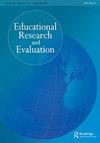Promoting conceptual replications in educational research
IF 3.3
Q1 EDUCATION & EDUCATIONAL RESEARCH
引用次数: 1
Abstract
Despite the abundant and frequent calls for replication studies from research communities (e.g., Shavelson & Towne, 2002) and funding agencies (e.g., Institute of Education Sciences [IES] & National Science Foundation [NSF], 2013), the number of such studies remains stubbornly small. For example, in an analysis of all articles published since 1900 in the top-10 psychological journals, Makel et al. (2012) found that less than 1% were replication studies. Moreover, from the top100 education journals, as ranked by a 5-year impact factor, Makel and Plucker (2014) found that only 0.13% of articles were replication studies, with most successful replications being authored by the same individuals who had carried out the initial studies. Among all research articles published in the Journal for Research in Mathematics Education (JRME) from its inception in 1970 through 2016, only about 3% clearly intended to replicate prior studies (Cai et al., 2018). And, at the IES in the United States, the majority of funded grant applications have not explicitly stated an intent to conduct a replication (Chhin et al., 2018). There are many reasons for the limited number of published replication studies. One major reason is a lack of clarity with respect to the nature of replications and their significance. There has, however, been increasing recognition of the importance of replication studies. Replication studies provide new knowledge and can help researchers, practitioners, and policymakers gain insights about which interventions improve (or do not improve) education outcomes, for whom, and under what conditions (Cai et al., 2018; NSF & IES, 2018). Perry et al. (2022) found that despite their small number, the rate of replication studies in education has gradually increased from 2011 to 2020. Fortunately, some journals have published special issues on replication studies, such as this special issue of Educational Research and Evaluation (ERE) and that in JRME (Cai et al., 2018). In addition, funding agencies such as the NSF and IES in the United States have explicitly called for grant proposals for replication studies (NSF & IES, 2018).促进教育研究中的概念复制
尽管研究界(例如,Shavelson&Towne,2002)和资助机构(例如,教育科学研究所[IES]和国家科学基金会[NSF],2013)频繁呼吁进行复制研究,但此类研究的数量仍然很少。例如,在对1900年以来发表在前十大心理学期刊上的所有文章的分析中,Makel等人(2012)发现,只有不到1%的文章是复制研究。此外,Makel和Plucker(2014)在按5年影响因素排名的前100种教育期刊中发现,只有0.13%的文章是复制研究,大多数成功的复制是由进行初步研究的同一个人撰写的。在《数学教育研究杂志》(JRME)从1970年创刊到2016年发表的所有研究文章中,只有约3%的文章明确打算复制先前的研究(Cai et al.,2018)。而且,在美国IES,大多数资助的拨款申请都没有明确表示有意进行复制(Chhin等人,2018)。发表的复制研究数量有限有很多原因。一个主要原因是对复制的性质及其意义缺乏明确性。然而,人们越来越认识到复制研究的重要性。复制研究提供了新的知识,可以帮助研究人员、从业者和政策制定者深入了解哪些干预措施可以改善(或不能改善)教育成果,对谁有利,以及在什么条件下(Cai et al.,2018;NSF&IES,2018)。Perry等人(2022)发现,尽管数量很少,但从2011年到2020年,教育中的复制研究率逐渐上升。幸运的是,一些期刊已经发表了关于复制研究的特刊,如本期《教育研究与评价》(ERE)和《JRME》(Cai et al.,2018)。此外,美国国家科学基金会和IES等资助机构明确呼吁为复制研究提供拨款建议(NSF&IES,2018)。
本文章由计算机程序翻译,如有差异,请以英文原文为准。
求助全文
约1分钟内获得全文
求助全文
来源期刊

Educational Research and Evaluation
EDUCATION & EDUCATIONAL RESEARCH-
CiteScore
3.00
自引率
0.00%
发文量
25
期刊介绍:
International, comparative and multidisciplinary in scope, Educational Research and Evaluation (ERE) publishes original, peer-reviewed academic articles dealing with research on issues of worldwide relevance in educational practice. The aim of the journal is to increase understanding of learning in pre-primary, primary, high school, college, university and adult education, and to contribute to the improvement of educational processes and outcomes. The journal seeks to promote cross-national and international comparative educational research by publishing findings relevant to the scholarly community, as well as to practitioners and others interested in education. The scope of the journal is deliberately broad in terms of both topics covered and disciplinary perspective.
 求助内容:
求助内容: 应助结果提醒方式:
应助结果提醒方式:


